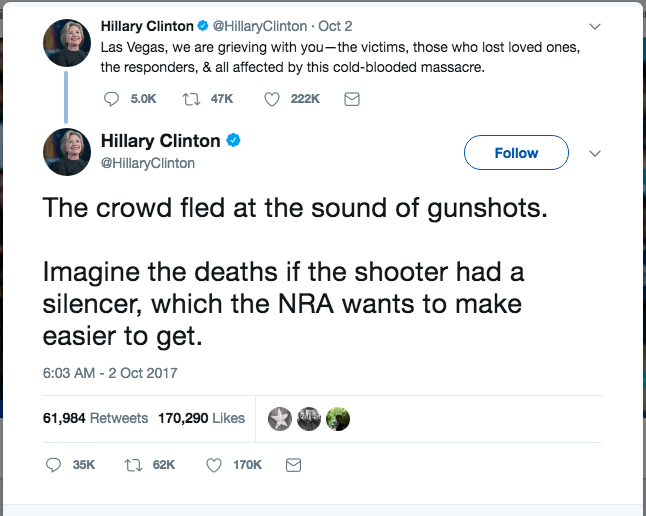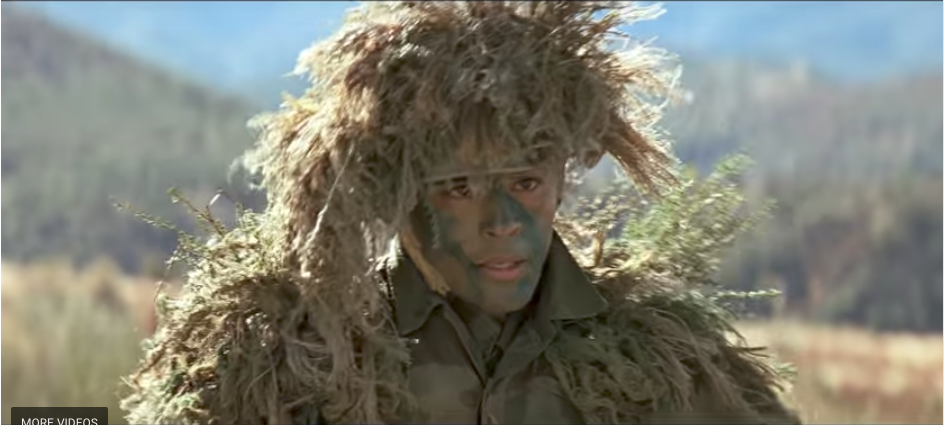
The day after the Las Vegas shooting Hillary Clinton tweeted, “The crowd fled at the sound of gunshots. Imagine the deaths if the shooter had a silencer, which the NRA wants to make easier to get,” which caused the Washington Post to write this story titled, “Why the debate over gun suppressors isn’t really relevant to what happened in Las Vegas.” The article explained that suppressors don’t work that way. A gun of the type used by the shooter makes quite a loud racket even with a silencer. People would still have run from gunshots.
Where did Hillary Clinton get the notion that an assault rifle could be made quiet by a silencer? I don’t know, but probably the same place where I did. The movies, where a silencer sounds like this:
Compare that to this video of an American military sniper training in Afghanistan:
So you’re probably not sneaking up on the sergeant major with that sound.
Clinton’s mistake illustrates why I am not a big fan of the overall tenor of violence in current storytelling (visual and written). Its lack of balance fools all of us into thinking differently about how violence works and its effects, and that makes all of us less capable of making good decisions when our government decides to use force on our behalf.
That’s one of the main reasons I wanted to tell the story I did in Gravlander. I wanted to show that a story that dealt somewhat more accurately with the aftermath of violence could still be entertaining. You can judge the results for yourself. I think I succeeded, and so do my core group of fans.
One area that particularly disturbs me in most films and novels is the lack of conscience, grief, or unforeseen consequences when violence is used by the good guys. I’m not a pacifist. In fact, I have a bit of a hawkish streak that I have to consciously keep in check. (It’s one reason I would make a terrible President. At first, I supported Bush’s Iraq war because I trusted Colin Powell. Yeah, mea culpa.)
But I tire of story telling that let’s X-wing pilots kill people hidden in their various masks without any thought to their humanity. The masks are necessary so that we the audience are spared their dying faces. Death in any meaningful sense would make Star Wars movies too heavy and damage the brand. Unless something changes, no one will ever die from a severed artery in a Star Wars film like they do in Iraq or Afghanistan. And better still, since we have conveniently manufactured an army of clones (episode 1-6), we need not worry about a child whose father will not come home or any other “collateral damage.”
The Marvel Civil War movie at least nods to the consequences of unchecked violence, but feels to me to be the exception that proves the rule. It exists so we can get back to Thanos and the coming infinity stone war. (Hey, the whole of the universe is at stake, right? What’s a few skyscrapers compared to that.) Civil War is also capped with the most ridiculous civilian revenge plot imaginable. I should be clear, I enjoyed Civil War as a film until the story collapsed under its own weight after the airport fight scene, just as I enjoy the Star Wars films.
But I wonder what it says about us as a nation that we seem to have a much higher craving for these kinds of films with their exaggerated heroism and violence without consequences than we do for stories that offer more realistic pictures of the human condition. Escape? Certainly. I’m all for it. I write it. But escape all the time, or even most of the time, I worry about. I worry even more about those who escape without being mindful that they are doing so.
There were several people who were armed and ready at the concert in Las Vegas. None of them fired back. Somehow, for each one, the heroic scenarios they imagined in order to carry a gun didn’t turn out like they thought they would.
